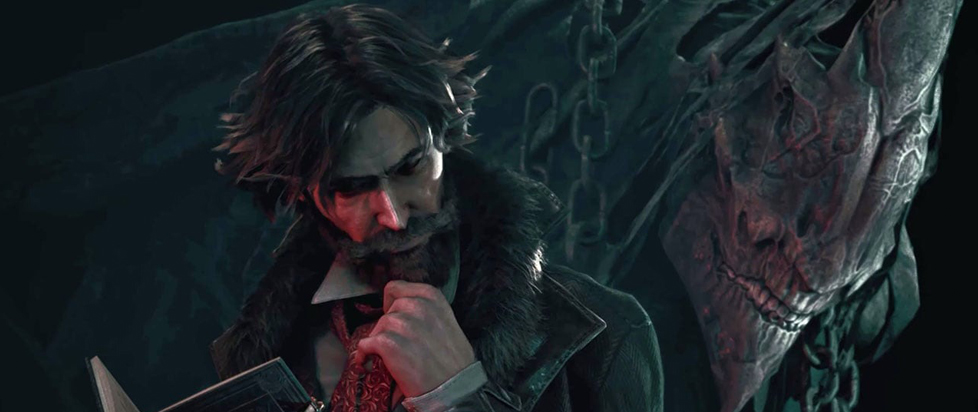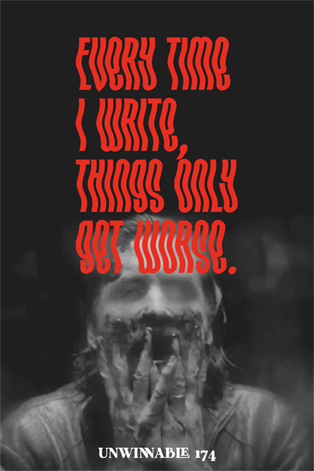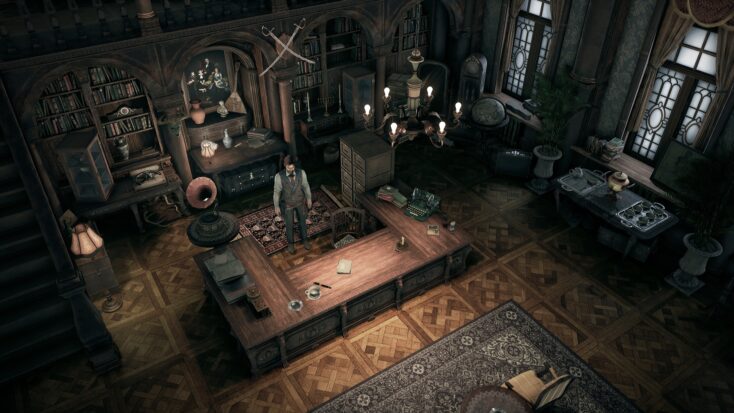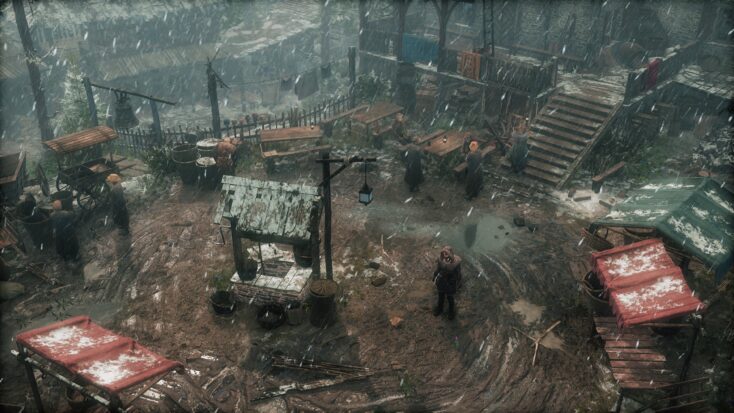
Empathetic Magic

This column is a reprint from Unwinnable Monthly #174. If you like what you see, grab the magazine for less than ten dollars, or subscribe and get all future magazines for half price.
———
Interfacing in the millennium.
———
This article contains spoilers for the “coterie” ending of The Thaumaturge. It also assumes that you weren’t a little rat traitor bitch and didn’t betray Ariel Rofe, my favorite character.
You can spend a lot of time in The Thaumaturge just wandering around Warsaw, feeling your way through the city. Wiktor Szulski, the protagonist, is a local who hasn’t been home for a very long time, and he spends much of the game remembering how his city works and sensing the changes within it. As a thaumaturge, this comes naturally to him; almost all of the magic he employs in-game has to do with empathy, perceiving the feelings of those around him, understanding how they affect the air in a room or the sentiment in a city, and occasionally manipulating them to forward his own aims. Except for the decently interesting but repetitive combat system, every other mechanic in the game contributes to the sense of Wiktor as a sort of emotional sponge, a voluntary receptacle for the fleeting fears and hopes of the people around him, and consequently almost a physical manifestation of Warsaw itself, with all its discomfort and diversity.
Much of the moment-to-moment gameplay revolves around Traces, which are somewhere between clues from a point-and-click mystery and the digital replay flashbacks from Tacoma. Just by touching an object, Wiktor gets a flash of the emotions it carries – not just broad strokes of them, either, but an actual perception of the moment in time that someone else came into contact with the object, a short, vivid insight into both their head and their life. He knows the exact angle at which the housekeeper placed the tea tray on his bedside table while she was waiting anxiously for him to wake from a sickness; he knows that the person who left a newspaper on the bench before him was passing the time before a date and was worried about whether his expensive new outfit would go over well. The effect is less transactional than it would feel if Wiktor was simply detecting through logic. The frequency of these traces and Wiktor’s ease of accessing them give the impression that he can’t help but catch these glimpses of other people’s lives, an effect both intimate and voyeuristic.

Traces are interpreted through Wiktor’s skill with various aspects – Word, Deed, Heart and Mind – the exact meaning of which is a bit vague, but what is clear is that his development of these skills is key to his ability to comprehend the world and the people around him. This is where Wiktor’s other great emotional trouble comes into play: the salutors that you collect throughout the game are the conduits through which you access these deeper reserves of emotional understanding, and they’re tied not to strength in positive emotion or any guile or charisma in the way we’re familiar with from other roleplaying games, but to flaws, excessive and dangerous buildups of negative emotion, which attract the salutors like moths to a flame – and, in return, they exacerbate, in both the host of the flaw and the others around them.
This is how Wiktor identifies the presence of a salutor, long before the spirit shows itself. A quiet, harmonious community is suddenly restless and wrathful? It’s Bukavac, following the flaw of Vehemence in a girl who killed her abusive father, then burned down his house to hide the evidence. The neighborhood pub suddenly has an uptick in drunken games of chance, aimless fights, violence for violence’s sake? Wiktor follows the flaw of Recklessness to find Lelek eagerly stalking a soldier who lost his sense of purpose not after his wife left him, as his friends think, but after the death of his comrade-in-arms (or maybe more) on the front lines. Once he finds the salutor, Wiktor captures it by freeing the host of their flaw – and taking it on himself. Through a delightful combination of neighborly compassion and thaumaturgical greed Wiktor can become an immensely powerful and capable thaumaturge with a host of frightening, dangerous salutors who is constantly under the threat of breaking under the weight of the flaws he has taken and the strength it requires to maintain his sanity through this foreign, warping influence on his mind and his personality. His grasp on reality is maintained solely by visits to his spirit healer Rasputin, who hypnotizes him back into calm and stability every time he catches a new salutor with only minor implications for his personhood, agency and ability to survive without the resources and reassurance provided by a paternalizing outside force.
What both the traces and the flaws encourage is a sense within the game that people influence each other, that a community is a flexible, organic thing and that environment and physical space is affected by the people who live within it. Wiktor’s entire mode of interaction with the world is one of applied empathy, concentrated and made into magic through the indefinite occultisms of thaumaturgy. His power is entirely focused on other people, on his ability to understand them and influence him, and on his attunement to their ordinary modes of living within the world. It’s no coincidence that when Wiktor is at his weakest, at the beginning of the game, he’s alone; when he returns to Warsaw, his family and his community, his power is able to grow.

This theme comes to a head if Wiktor chooses to follow in his father’s footsteps at the end of the game and form a thaumaturge “coterie,” where he and other thaumaturges make a pact to share their power, lessening their individual burdens, and join forces against Tsar Alexander, whose regime is fanning anti-thaumaturge sentiment right alongside anti-Semitism and anti-socialism. The coterie is quite the motley crew: Wiktor, who in addition to being old money from a family of thaumaturges is half-Russian; Madame Samira, a Jewish orphan, fake psychic and former informer for the secret police; Ariel Rofe, a “circumcised atheist,” bootlegger, and underworld kingpin; and Emir Burnakovich, a Muslim Tatar faldjey who stitches up the socialists when their demonstrations go south. It’s a neat cross-section of Warsaw society, emphasizing the rich, diverse community that flourished there in 1905. But it also becomes a moment where, as thaumaturges, these characters power – and therefore empathy – is most acute. As they dedicate themselves to the pact, swearing on the things they care for and the ideals they hold, a minor loss of self takes place. They lose their secrets, from Samira’s favorite color to the body buried in Wiktor’s garden. In dedicating themselves to their pact, through the empathetic magic of thaumaturgy, the coterie slip sideways into the memory and feeling of their companions, not just understanding the perspective of someone else but assuming it. It is with this uncanny connection, this four-as-one melding of the myriad human difference within Warsaw society, that they approach Tsar Alexander and demand – whether politely but firmly, or violently – safety and recognition, for themselves and each other.
Perhaps if The Thaumaturge were a less clever game, this would have simply been a well-written cutscene at the end of a fairly standard RPG. But because the non-combat systems of the game work together to emphasize Wiktor’s reliance on the people around him and his access to and understanding of their feelings, it feels like the natural course of the narrative that the climactic expression of the magic of thaumaturges would be the dissolution of all barriers and the creation of pure empathy. The Thaumaturge rejects the segregation of difference that tends to haunt video games in particular, as the medium lends itself to neatly-legible maps and the logic of finding a character from x group in y place, instead placing Wiktor inside a fluid, dynamic world in which the fears and hopes of its citizens are a direct concern of their neighbors, whether they share in-groups or not. He cannot go anywhere without tasting the life within Warsaw, and he’s only able to stand up against the occupying power of the Tsar when he connects himself – as intimately as any human can – with the others around him. So, they share their fate.
———
Maddi Chilton is an internet artifact from St. Louis, Missouri. Follow her on Twitter @allpalaces.




